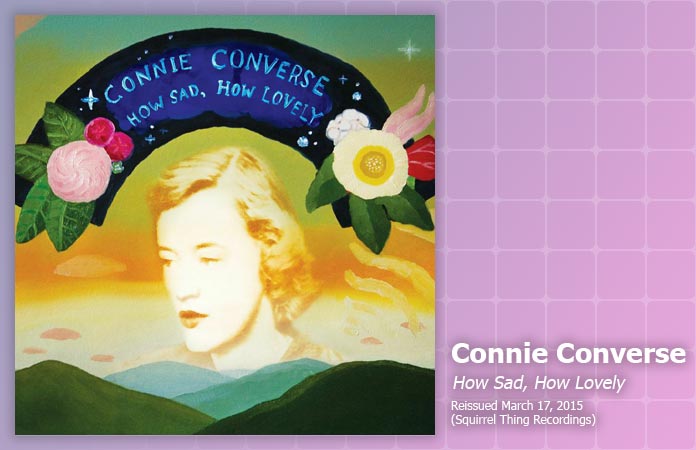Music Review: Connie Converse, How Sad, How Lovely
Published on March 20th, 2015 in: Current Faves, Feminism, Music, Music Reviews, Reissues, Retrovirus, Reviews |The story of Connie Converse is both fascinating and distressingly common. After leaving college and heading to New York City in 1949, she wrote and recorded poetic, wry, revealing songs accompanying herself on acoustic guitar. Despite intervention and best intentions of friends (animator Gene Deitch and colleague Bill Bernal) who worked to get Converse’s music heard by a wider audience, she abandoned everything. She wrote a series of goodbye notes to friends, packed up her Volkswagen, and disappeared in 1974. No one has heard from her since. She would be 90 now.
Gene Deitch recorded Connie singing her songs in her apartment and his kitchen and these songs are unearthed on Squirrel Thing Recordings’ How Sad, How Lovely. The recordings are rough and have tape hiss (they were recorded reel-to-reel), and are simply Converse singing in her surprisingly formal manner (as was the style the times dictated) with her guitar. The songs are charming and unusual and bold. They speak of yearning and sexual frustration, sadness and hope. They’re poignant and personal and revealing, yet veiled.
While it is doubtful that Converse played any gigs in public, she did play on CBS’s Morning Show With Walter Cronkite, performing the winsome “Talkin’ Like You (Two Tall Mountains).” The lyrics, about finding her ex-lover’s voice everywhere, are expressionistic (“Up that tree/that sort of a squirrel thing/sounds just like we did/when we were quarreling”). The melody is regretful and moving, her vocals understated with very distinctive round vowels. Her vocal style is idiosyncratic; on “Johnny’s Brother,” a sort-of folk song that follows the parallel journeys of the man the narrator marries and his brother with wanderlust, her voice is warm yet patrician.
Converse plays with the sexual mores and roles of the times with “Roving Woman.” “A lady never should/habituate saloons/and that is where I find myself/in many afternoons/ but just as I begin to/blow away the foam/ someone tips his hat to me/and takes me home,” she sings, straining against societal rules. She is ”saved” by men, but to what purposes? On the gently swinging “Man In The Sky,” Converse finds herself giving up on men entirely to pursue Orion, the titular “Man.” On a warm trip through the constellations and their alter identities, our narrator finds herself no happier or more fulfilled than she was when she began her trip.
The title track, “How Sad, How Lovely” ruminates on the evocative magic of the sunset at the hush of dusk. “Father Neptune” boasts a sea faring melody in a prayer to the God of the Sea (“I sing to the god/ with a three-pronged rod/and with whiskers wild and free/but I’ve got a man/with a beard and a tan/and a passion for the sea”) in Converse’s rich, low register. “Playboy Of The West” has a fascinating melody, with Converse’s vocals leaping and skipping nimbly up the scale. The guitar has a curious urgency on this angular and jazzy character sketch.
It’s not often that I write about an album for review that I think, “I really need this on vinyl,” but How Sad, How Lovely is going into my collection immediately. It is such a dreadful shame that Connie Converse didn’t receive acclaim while she was making music. How Sad, How Lovely is aptly titled. It’s a treasure, an overlooked gem with wonderful lyrics and Converse’s singular vocals.
How Sad, How Lovely was reissued by Squirrel Thing Recordings on March 17.

Time limit is exhausted. Please reload the CAPTCHA.